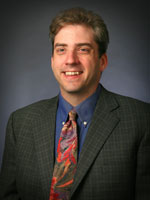Assistant professor releases new CD, uses work as composer to teach students
Elliott McKinley, assistant professor of music and music program coordinator, knows that his work as a composer will ultimately enhance the learning experience of his students in the classroom. Active as a professional composer, he has composed music that has been performed throughout the United States, Canada and Europe.
“My experiences as a composer and a musician come back to the classroom directly, giving students an idea of what it is like to work as a professional in the field. It is the kind of thing that a textbook cannot really demonstrate.” Further, McKinley’s music has acted as a draw for students. “Potential composition students get to know me through my music and sometimes that is enough to encourage them to study with me. I know of several students who have come to IU East specifically because they have heard my music. It’s like a business card of sorts.”
McKinley recently released a new CD recording, “String Quartets.” The CD, released by Navona Records and distributed by Naxos, features three string quartets composed over a 10-year period by McKinley. The Martinů String Quartet of Prague commissioned and premiered each of these quartets and is also the performing ensemble on the CD. One of these quartets, McKinley’s sixth quartet, had its recording supported by an IU East Faculty Research Support Grant in 2009.
In addition to the new CD, McKinley was recently commissioned by the Essex Chamber Music Players in Boston to write a new piece commemorating the 50th anniversary of Northern Essex Community College. The work, a trio for flute, cello, and piano, will be premiered on March 25, 2011, at Northern Essex Community College.
McKinley received another IU East Faculty Research Support Grant to record a recent composition, “Three Symphonic Moods,” commissioned and premiered by the Whatcom Symphony Orchestra last November. When asked about “Three Symphonic Moods,” McKinley said, “I knew going in that this wouldn’t be a symphony. I wanted each movement to explore a different feeling or mood, hence the title.” The recording took place in August with the Slovak Radio Symphony Orchestra under the direction of Kirk Trevor. Maestro Trevor is also the music director of the Indianapolis Chamber Orchestra, and has known McKinley for over ten years.
When the edited recording becomes available, McKinley will use the piece in his orchestration and arranging course. Such direct contact, not only with the music but also with the composer, he says, is invaluable to students.
McKinley goes beyond recordings of his music to instruct students on composition. This fall, his students were embedded with the Richmond Symphony Orchestra in a rehearsal. This allowed the students to get a sense of music and the experience from the musicians’ standpoint. Many students may not be directly familiar with playing an instrument thus the experience of seeing musicians at work, gives them an invaluable lesson on the issues, problems, and solutions that occur while preparing a musical performance.
Guy Bordo, music director/conductor for the Richmond Symphony Orchestra, said a big part of the RSO’s mission is education.
“We are always glad to see students taking advantage of the opportunities we can provide. The growth that IU East has been experiencing is exciting and we are very glad to help enhance those experiences.
“It is always very important for students studying orchestration or composition to see the practical application of what they are doing. It is one thing to put notes on a page. But it is completely different to see the results of what a composer does with a live orchestra,” Bordo said. “Playing music is not an exact science, it is an art. So there are many ways to interpret the notation we use. Seeing that done first hand is invaluable to a student in music.”
By shadowing the musicians, students were able to get a sense of how the sounds blend together, to watch the musician’s mechanics, and to be more aware of the problems that could be encountered. They can use that experience to their benefit as they work on their own music, McKinley added.

